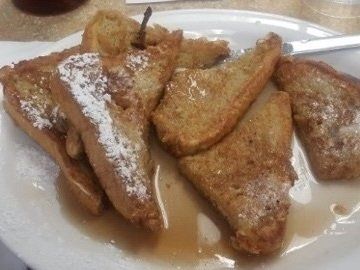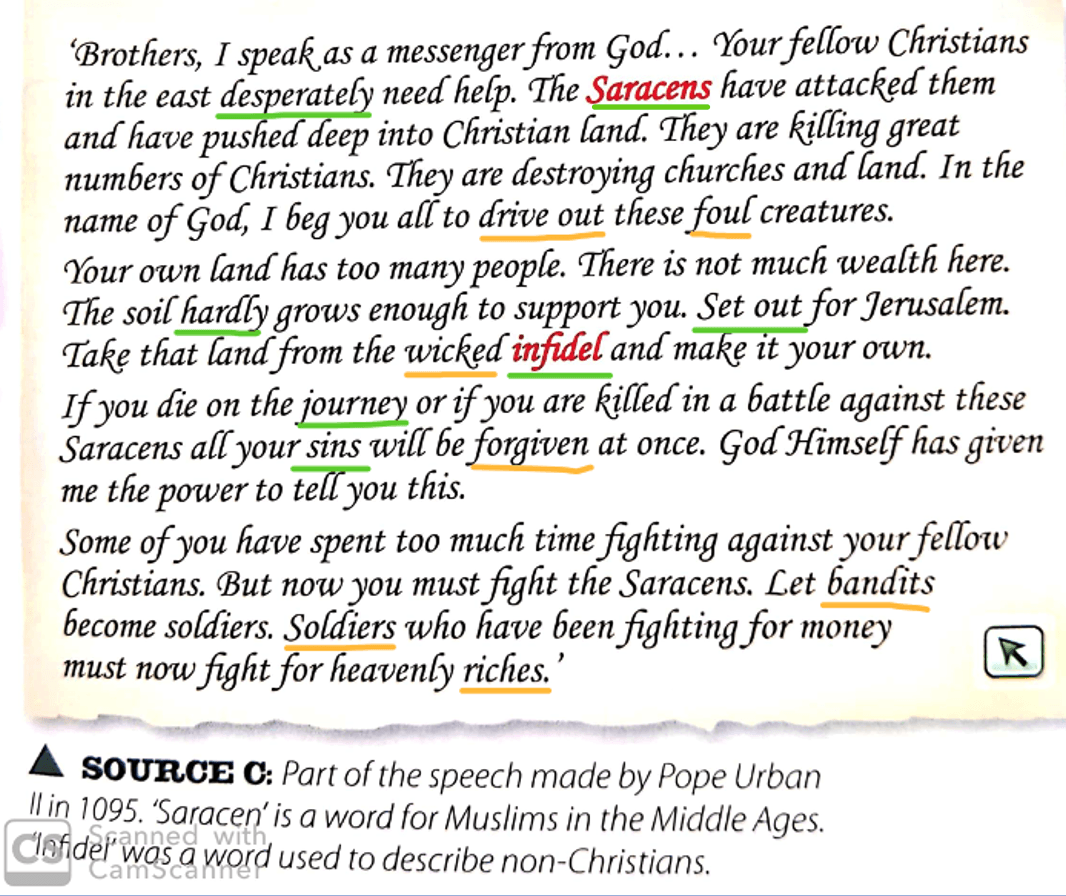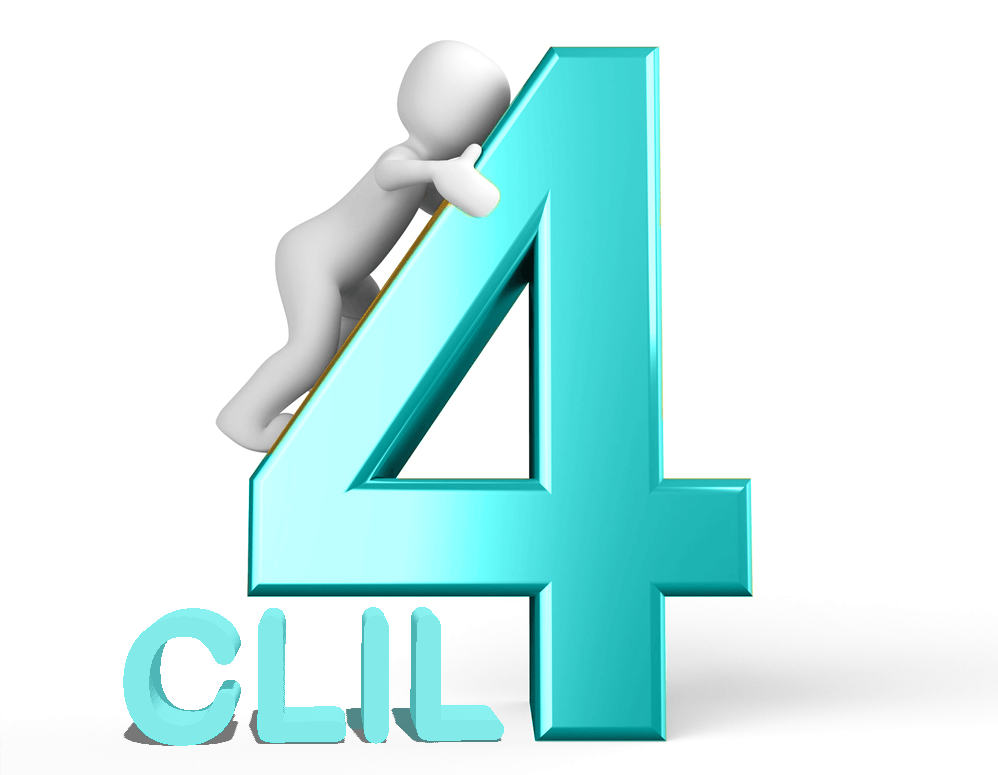Bronnen lezen: kruistochten
CLIL-vak: Geschiedenis
Graad: 2de graad
Sleutelcompetentie: Historisch bewustzijn
Eindtermen:
Kritisch reflecteren met en over historische bronnen:
8.4. De leerlingen evalueren de presentatie, de context, de betrouwbaarheid, de representativiteit en bruikbaarheid van historische bronnen in het licht van een historische vraag.
Andere talen
Eindtermen:
3.1 De leerlingen zijn gemotiveerd voor taal m.i.v. cultuur, lezen, spreken, schrijven, luisteren en inzicht in het taalsysteem. (attitudinaal)
3.3 De leerlingen ontwikkelen durf om te communiceren. (attitudinaal)
3.4 De leerlingen bepalen het onderwerp en de globale inhoud van geschreven en gesproken teksten in functie van doelgerichte communicatie.
3.5 De leerlingen bepalen wat de hoofdgedachte en de hoofdpunten zijn in geschreven en gesproken teksten in functie van doelgerichte communicatie.
3.6 De leerlingen selecteren relevante informatie in geschreven en gesproken teksten in functie van doelgerichte communicatie.
3.8 De leerlingen gebruiken kenmerken, mogelijkheden en principes van vreemde talen als communicatiemiddelen in functie van doelgerichte communicatie.
3.11 De leerlingen tonen interesse in culturele contexten waarin vreemde talen worden gebruikt. (attitudinaal)
Leerplandoelen Katholiek Onderwijs Vlaanderen:
Leerplandoel 17 domein + leerplandoel 20 domeinoverschrijdend: De leerlingen leiden informatie af uit een historische bron om een historische vraag te beantwoorden, rekening houdend met het redeneren over historische bronnen.
Leerplandoelen GO:
Kritisch reflecteren met en over historische bronnen:
De leerlingen evalueren de presentatie, de context, de betrouwbaarheid, de representativiteit en bruikbaarheid van historische bronnen in het licht van een historische vraag.
Doeltaal: Engels
Lesonderwerp: Kritisch reflecteren met en over bronnen van de kruistochten.
Taalvaardigheid: Lees- en gespreksvaardigheid
Samenwerking met taalleraar:
Tip 5 Leerplandoelen – Ga na welke leerplandoelen in elkaars les aan bod kunnen komen.
Adjectieven met positieve en negatieve betekenis aanbrengen en inoefenen in de les Engels om makkelijker de historische bronnen te kunnen lezen. De gekozen adjectieven in de les Engels worden afgestemd op de woordenschat in de historische bronnen in de les geschiedenis. Leerstrategieën uit de les Engels worden toegepast in de les geschiedenis.
Focus voor de CLIL-leraar: Spreekkansen creëren, leesbegrip van de bron verhogen.
Doelen
Geschiedenis:
De leerlingen leiden informatie af uit een historische bron om een historische vraag te beantwoorden, rekening houdend met het redeneren over historische bronnen. (Leerplandoel 17 en 20 KOV)
Taal:
In mondeling overleg met een medeleerling vragen over een historische bron beantwoorden.
Context
De klasgroep buigt zich over de Speech van Urbanus II. De klasgroep wordt onderverdeeld in duo’s. Binnen elk duo krijgt telkens één leerling de A-versie van de historische bron met vragen en één leerling de B-versie van de bron. Dit zorgt ervoor dat de leerlingen onderling van elkaar afhankelijk zijn. Ze hebben immers allebei een deel van de antwoorden op de vragen bij de bron. Ze moeten met elkaar in het Engels communiceren om alle vragen te kunnen oplossen.
Lesfragment
De leerkracht leest de speech van paus Urbanus voor, zodat leerlingen weten hoe ze de woorden precies moeten uitspreken. Ze duiden in fluo woorden aan die voor hen moeilijk zijn. Vervolgens gaan ze in duo aan de slag met de inhoud van de bron. Er is in elk duo één leerling met de A-versie en één leerling met de B-versie. Beide versies bevatten alle vragen, en telkens een ander deel van de antwoorden over de tekst. Zo kunnen ze elkaar helpen bij het oplossen van de vragen over de brontekst.
De leerlingen spreken onderling Engels.
- Ze herkennen de aangebrachte adjectieven uit de les Engels zoals het woord “wicked” en weten dat het een negatieve betekenis heeft. Om de leerlingen te duiden op het reeds gekende woord wicked uit de les Engels wordt het in het geel onderlijnd. Dit inzicht uit de les Engels helpt de leerlingen om de historische bron juist te kunnen lezen. (zie Materialen 1)
- Andere woorden in het geel zijn termen die ze kennen uit andere lessen geschiedenis.
- De leerlingen krijgen scaffolding onder de vorm van een woordenlijst onderaan de bron. Deze verklaarde woorden zijn in de tekst in het groen onderlijnd om de leesbaarheid van de tekst te verhogen. (zie Materialen 2)
Materialen
1. Uitleg over de connotatie van adjectieven uit de les Engels
ADJECTIVES WITH POSITIVE AND NEGATIVE CONNOTATIONS
Introduction: ‘Take that land from the wicked non-believer and make it your own.’
wicked = evil or wrong, devilish, naughty (sounds negative)
e.g. a wicked and unscrupulous politician (slecht, goddeloos) (negative connotation)
Example 1

This is MOIST banana bread. (= slightly wet)
(positive connotation)

This is SOGGY French toast. (= extremely wet)
(negative connotation)
Words can offer a positive or a negative connotation.
Much of our interpretation will be based on cultural notions. Even two words that mean literally the same thing can carry very different connotations, simply because we’ve come to use them that way without a second thought.
Example:
- This sweater was so CHEAP! (more negative)
- This sweater was so AFFORDABLE (negative)
- This sweater was so INEXPENSIVE. (negative)
All three words mean that the sweater didn’t cost much, but ‘CHEAP’ is a word we typically use to imply that something is poorly made or of low quality.
Complete the list:
Put the following words next to the correct ‘partner’:
lively – plump – nosy – stench – pretty – weird – pushy – stubborn – generous – energetic – cheap – lazy – reserved – mature – strange – skinny – unique – childish
| POSITIVE CONNOTATION | NEGATIVE CONNOTATION | |
|---|---|---|
| 1 | fragrance / aroma | |
| 2 | determined | |
| 3 | laid-back | |
| 4 | slender | |
| 5 | youthful | |
| 6 | exceptional | |
| 7 | economical | |
| 8 | driven | |
| 9 | curious | |
| 10 | fat | |
| 11 | bizarre | |
| 12 | hyperactive | |
| 13 | elderly | |
| 14 | weird / peculiar | |
| 15 | timid | |
| 16 | extravagant | |
| 17 | hot | |
| 18 | noisy |
2. Historische bron met vragen en antwoorden voor duo’s en woordverklaring: A-versie en B-versie
The Crusades: Source: pupil A+B
First read the text. Secondly, in turns (pupil A-B), answer the questions on p. 2-3.

- The words underlined in yellow are not explained. This is because you are already familiar with them or because they look very much similar to Dutch words.
- The words underlined in green:
| Saracen (noun) | a word used in the past by Christians for a Muslim who fought in one of the religious wars of the 11th, 12th, 13th, and 17th centuries, against Christians |
|---|---|
| desperately (adv) | without any hope |
| hardly (adv) | nauwelijks |
| to set out for (verb) | vertrekken naar, op tocht gaan naar |
| infidel (noun) | someone who doesn’t believe in God |
| journey (noun) | an act of travelling (‘een tocht’) |
| sin (noun) | zonde |
Questions about the text
In turns, answer these questions orally. Pupil A begins.
In red, you see the information that your partner should give. If your partner doesn’t know the answer, you can help him/her.
1. Who made this speech?
Pupil A: This is the speech made by…
Pope Urban II (the Second)
2. When did he say this?
Pupil B: He gave/made this speech in… .
in 1095
3. Where did he say this?
Pupil A: He gave/made this speech in…
in Clermont-Ferrand (400 kilometres south of Paris)
4. In whose name does he speak?
Pupil B: He speaks in the name of…
God: he says “I speak as a messenger (boodschapper) of God” and “God himself has given me the power to tell you this.”
5. Who does the pope mean when he says “your fellow Christians in the east”?
- Muslims
- Orthodox
- Jewish
- Pagans
- The Arian Christians
- The Protestants
- the Byzantine Christians
Pupil A: With these words, the pope refers to…
the Orthodox or Byzantine Christians
6. How does the pope refer to the Muslims:
- Give three examples of words he uses: ….
Pupil B: …
the Saracens
foul creatures
the wicked infidel
- Do these words have a positive / neutral / negative connotation (think about your English lesson)?
Pupil B: …
“Foul creatures” and “wicked infidel” certainly have a negative connotation. “The Saracens” is a rather neutral word.
7. Where does the speaker want his listeners to go to?
Pupil A: He wants them to set out for / to go to …
Jerusalem
8. With what aim?
Pupil B: They must …
drive out the Muslims, take the land from them and make it their own.
9. What are the causes of the problems, according to the pope?
Pupil A: …
The Muslims have attacked the Orthodox Christians:
- they are killing them
- they are destroying churches and land
For questions 10 and 11, the answer is not in the text. Discuss these questions together; give your opinion and reason.
10. Is this a primary or a secondary source? Why?
Pupil B: In my opinion, this is a primary/secondary source because …
11. Is the message of the author trustworthy/reliable?
Pupil A: I believe this message is / isn’t reliable because …

